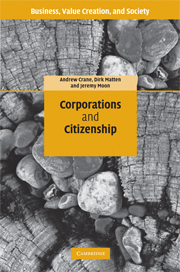Book contents
- Frontmatter
- Contents
- List of figures
- List of tables
- Foreword
- Preface
- Acknowledgements
- 1 Introducing corporations and citizenship
- Part A Corporations and citizenship relationships
- Part B Corporations and citizenship reconfigurations
- 5 Citizenship identities and the corporation
- 6 Citizenship ecologies and the corporation
- 7 Citizenship, globalization and the corporation
- 8 Conclusion
- References
- Index
7 - Citizenship, globalization and the corporation
Published online by Cambridge University Press: 22 September 2009
- Frontmatter
- Contents
- List of figures
- List of tables
- Foreword
- Preface
- Acknowledgements
- 1 Introducing corporations and citizenship
- Part A Corporations and citizenship relationships
- Part B Corporations and citizenship reconfigurations
- 5 Citizenship identities and the corporation
- 6 Citizenship ecologies and the corporation
- 7 Citizenship, globalization and the corporation
- 8 Conclusion
- References
- Index
Summary
The forces of envy, despair and terror in today's world are stronger than many of us realised. But they are not invincible. Against them, we must bring a message of solidarity, of mutual respect and, above all, of hope. Business cannot afford to be seen as the problem. It must, working with government, and with all the other actors in society, be part of the solution.
UN Secretary Kofi Annan, Address to the World Economic Forum, 5 February 2002Introduction
Throughout this book we have frequently come across the phenomenon of globalization. Initially we discussed the rise of corporate participation in a citizen-like way in the governance of various global issues, such as global warming and the fight against pandemics (Chapter 2). We also saw a shifting corporate role towards a government-like involvement in, for instance, governing global markets for goods and services or governing civic entitlements in global supply chains in countries with weak governance institutions (Chapter 3). In Chapter 4 we analyzed the political aspects of the community formed by the firm and its stakeholders and frequently referred to the potential global reach of this new arena. In this chapter, we first analyze and theorize the impact of globalization on the corporate involvement in the citizenship arena more systematically and, second, examine the effects of globalization on the reconfiguration of the very notion of citizenship itself and the role of corporations in shaping, and being impacted by, this process.
- Type
- Chapter
- Information
- Corporations and Citizenship , pp. 169 - 200Publisher: Cambridge University PressPrint publication year: 2008

